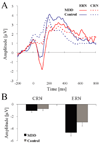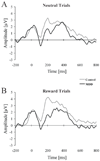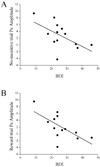Effects of task-relevant incentives on the electrophysiological correlates of error processing in major depressive disorder
- PMID: 20233960
- PMCID: PMC3036946
- DOI: 10.3758/CABN.10.1.119
Effects of task-relevant incentives on the electrophysiological correlates of error processing in major depressive disorder
Abstract
Major depressive disorder (MDD) is associated with action-monitoring dysfunction-particularly, disrupted error processing. Whether such dysregulation is further modulated by task incentives is largely unknown. The goal of this study was to investigate possible dysfunctions in error processing in MDD as a function of varying task incentives and clinical profile. To this end, we recorded the error-related negativity (ERN) and error positivity (Pe) in 18 MDD participants and 18 healthy controls during a Stroop task that intermixed no-incentive and reward trials. Relative to controls, MDD participants showed (1) larger ERN irrespective of task incentives, and (2) reduced Pe during reward (but not no-incentive) trials. Moreover, among MDD participants, Pe amplitudes were negatively correlated with depression severity and clinical symptoms. The present findings highlight distinct effects of task incentives on electrophysiological components of error processing and are interpreted within current theories of action monitoring and incentive processing in depression.
Figures




Similar articles
-
Action monitoring and depressive symptom reduction in major depressive disorder.Int J Psychophysiol. 2009 Mar;71(3):218-24. doi: 10.1016/j.ijpsycho.2008.09.005. Epub 2008 Sep 30. Int J Psychophysiol. 2009. PMID: 18926863
-
Spatiotemporal dynamics of error processing dysfunctions in major depressive disorder.Arch Gen Psychiatry. 2008 Feb;65(2):179-88. doi: 10.1001/archgenpsychiatry.2007.19. Arch Gen Psychiatry. 2008. PMID: 18250256 Free PMC article.
-
Unavoidable errors: a spatio-temporal analysis of time-course and neural sources of evoked potentials associated with error processing in a speeded task.Neuropsychologia. 2008 Aug;46(10):2545-55. doi: 10.1016/j.neuropsychologia.2008.04.006. Epub 2008 Jun 3. Neuropsychologia. 2008. PMID: 18533202
-
Depression symptom severity and error-related brain activity.Psychiatry Res. 2010 Aug 30;179(1):30-7. doi: 10.1016/j.psychres.2010.06.008. Epub 2010 Jul 13. Psychiatry Res. 2010. PMID: 20630603
-
Neural origins of psychosocial functioning impairments in major depression.Lancet Psychiatry. 2015 Sep;2(9):835-43. doi: 10.1016/S2215-0366(15)00237-0. Lancet Psychiatry. 2015. PMID: 26360902 Review.
Cited by
-
A genetic variant brain-derived neurotrophic factor (BDNF) polymorphism interacts with hostile parenting to predict error-related brain activity and thereby risk for internalizing disorders in children.Dev Psychopathol. 2018 Feb;30(1):125-141. doi: 10.1017/S0954579417000517. Epub 2017 Apr 21. Dev Psychopathol. 2018. PMID: 28427482 Free PMC article.
-
Increased error-related brain activity distinguishes generalized anxiety disorder with and without comorbid major depressive disorder.J Abnorm Psychol. 2012 Nov;121(4):885-96. doi: 10.1037/a0028270. Epub 2012 May 7. J Abnorm Psychol. 2012. PMID: 22564180 Free PMC article.
-
Moderation of the relationship between the error-related negativity and anxiety by age and gender in young children: A preliminary investigation.Dev Cogn Neurosci. 2019 Oct;39:100702. doi: 10.1016/j.dcn.2019.100702. Epub 2019 Aug 19. Dev Cogn Neurosci. 2019. PMID: 31494429 Free PMC article.
-
Post-error Brain Activity Correlates With Incidental Memory for Negative Words.Front Hum Neurosci. 2018 May 8;12:178. doi: 10.3389/fnhum.2018.00178. eCollection 2018. Front Hum Neurosci. 2018. PMID: 29867408 Free PMC article.
-
Blunted neural response to errors as a trait marker of melancholic depression.Biol Psychol. 2016 Jan;113:100-7. doi: 10.1016/j.biopsycho.2015.11.012. Epub 2015 Nov 27. Biol Psychol. 2016. PMID: 26638761 Free PMC article.
References
-
- Alexopoulos GS, Kiosses DN, Heo M, Murphy CF, Shanmugham B, Gunning-Dixon F. Executive dysfunction and the course of geriatric depression. Biological Psychiatry. 2005;58:204–210. - PubMed
-
- Alexopoulos GS, Murphy CF, Gunning-Dixon FM, Kalayam B, Katz R, Kanellopoulos D, et al. Event-related potentials in an emotional go/no-go task and remission of geriatric depression. Neuroreport. 2007;18:217–221. - PubMed
-
- Althaus M, Groen Y, Wijers AA, Mulder LJ, Minderaa RB, Kema IP, et al. Differential effects of 5-HTTLPR and DRD2/ANKK1 polymorphisms on electrocortical measures of error and feedback processing in children. Clinical Neurophysiology. 2009;120:93–107. - PubMed
-
- American Psychiatric Association. Diagnostic and Statistical Manual of Mental Disorders. 4th Ed. Washington, D.C: American Psychiatric Press; 1994. 4 ed.
-
- Beats BC, Sahakian BJ, Levy R. Cognitive performance in tests sensitive to frontal lobe dysfunction in the elderly depressed. Psychological Medicine. 1996;26:591–603. - PubMed
Publication types
MeSH terms
Grants and funding
LinkOut - more resources
Full Text Sources
